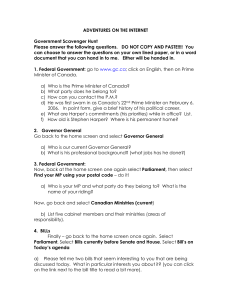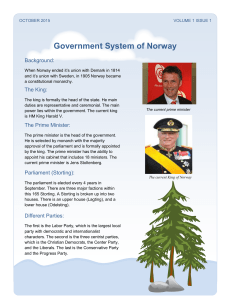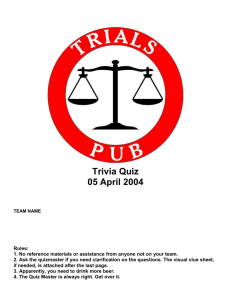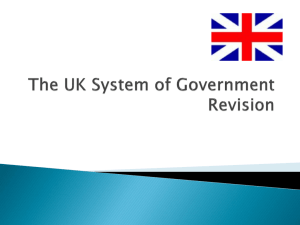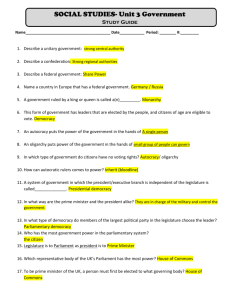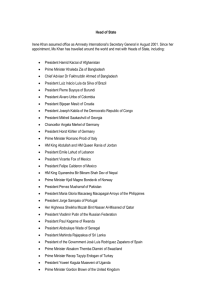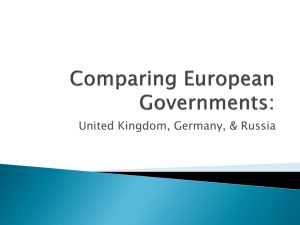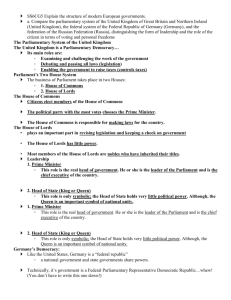Rewards
advertisement
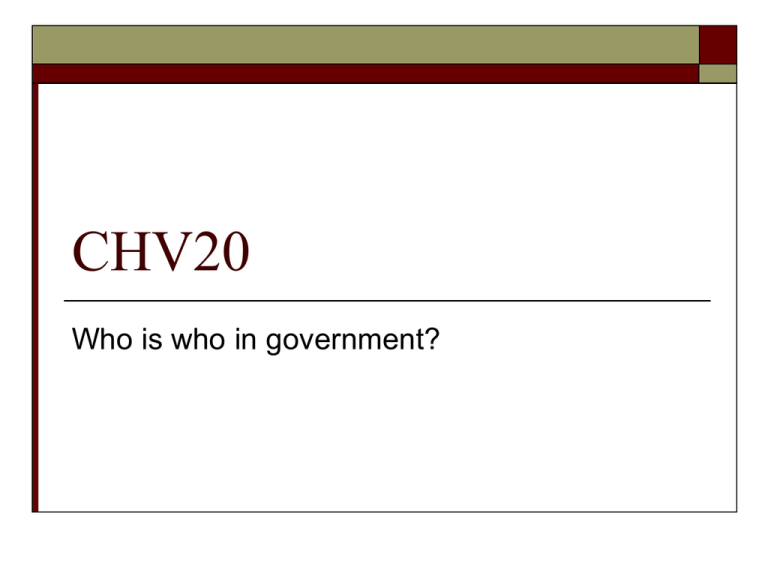
CHV20 Who is who in government? Monarch / Queen The head of state of Canada and 13 other nations In theory holds all the power In reality, has none Rewards One of the richest women in the world Many castles Extensive travel Queen for life Monarch Continued Two viewpoints: The queen is a useless relic of the colonial past Doesn’t reflect Canada’s multicultural nature Or Personifies the state and symbolizes the rule of law Humanizes authority, symbol of hope Reflect Which viewpoint do you agree with more? Do you think Canada should continue having a Queen? Governor General Appointed by the Queen on the recommendation of the Prime Minister Represents the Queen and therefore the nation, not the government Non-partisan Signs all bills into law (Royal Assent) David Johnston – 0ct 2010 GG continued Ceremonial role Celebrates national identity and unity Welcomes foreign dignitaries Appoints the prime minister Gives awards (e.g. Order of Canada) Reads the Speech from the Throne at the start of Parliament GG continued Rewards Salary of $119,236 Travel across Canada and the world Free house (Rideau Hall) 5 year term Lieutenant-Governor (said left-tenant) Current holder for Ontario: David C. Onley Appointed by the Governor General on the recommendation of the Prime Minister Represents the Queen in a province Same responsibilities as Governor General but for a province Lieutenant-Governor (said left-tenant) Rewards: Salary of $110 000 and a title – Your Honour Usually champions a cause 5 year term Reflect Is a Lieutenant-Governor necessary? Why or why not? Prime Minister Appointed by the Governor-General Is the leader of the party with the most seats in the House of Commons Holds real power in Canada Prime Minister continued Chooses cabinet ministers Chooses the Governor General, Lieutenant Governors, Supreme Court Justices, Defense Chiefs, heads of crown corporations (e.g. Canada Post) etc. Sets the direction for the government and can profoundly change the country Prime Minister continued John A. MacDonald confederated Canada Laurier settled the West Mackenzie King introduced social welfare Pierre Trudeau introduced multiculturalism and bilingualism Mulroney introduced the GST Kim Campbell was the first female PM Jean Chretien saved Canada from separating Paul Martin did…..not sure Stephen Harper Prime Minister continued Rewards: Travel and expense account Free house - 24 Sussex Dr. Salary of $300 000 per year All the power and responsibility Reflect: Does the Prime Minister have too much power? Explain. Senate Appointed by the Governor General on the recommendation of the Prime Minister Must retire at 75 (used to be appointed for life) Upper house Consider legislation passed by the House of Commons Can be very busy with causes or very negligent with vacations Senate continued The Senate was created for three reasons: 1. To allow the rich and powerful a final say on the laws Must own $4000 worth of land 2. Appointed officials have no conflicts of interest No worry about losing an election by being right but unpopular 3. To represent regional interests better than the House of Commons Senate continued 105 Senators represent Canada’s regions 24 from each of Ontario and Quebec 10 each from Nova Scotia and New Brunswick 6 from Newfoundland 4 from PEI 6 each from the Western Provinces 1 from each of the territories Senate continued Rewards: Can help raise the profile of a cause Discuss new laws $122 700 annual salary plus 64 first class round trip air tickets for anywhere in Canada Reflect: Do you think the Senate should be elected? Why or why not? What are the advantages and disadvantages of an appointed Senate? Members of Parliament 308 members elected by the residents of a riding or constituency Ridings are approximately 100 000 residents Ontario and Quebec hold 60% of the seats in the House Members of Parliament continued Represent their party and their constituents Help the public connect with government Vote with their party on laws Sit on committees to review legislation Can have additional jobs e.g. minister, leader of the opposition, critic, speaker, whip, etc. Members of Parliament continued Rewards Annual salary of $150 800 plus 64 first class round trip air tickets for anywhere in Canada Additional salary for additional jobs ($72 000 for ministers) Personal satisfaction of serving their country Reflect: Do MPs get paid enough or too much? Explain. Premier Appointed by the Lieutenant Governor of a province The leader of the party with the most seats in the Provincial Parliament (or legislature) Our Premier is Kathleen Wynne Same responsibilities as the Prime Minister, but for the province Education, Health, Family Law, Municipalities, etc. Premier continued Rewards Can make a difference in the above issues for a province $200 000 salary plus expense account Reflect: Why would someone choose to run for provincial politics instead of national politics? Members of Provincial Parliament Represent their party and constituents at the provincial level of government Our MPP – Laurie Scott (Conservative) Salary (2010) $133,217.04 Mayor and City Councillors Municipal Government Mayor elected directly by the people Local police City parks Snow removal Public transport Water sewage Responsibilities Councillors and mayor do not represent a political party Fire fighting Property tax Garbage libraries Local roads Municipal Government continued Rewards Mayor Ric McGee $85, 000 a year for mayor of CKL (168, 000 for the Major of Toronto) $25,000 for city councilors in CKL (about 65,000 for Toronto) Direct impact on the lives of your neighbours

